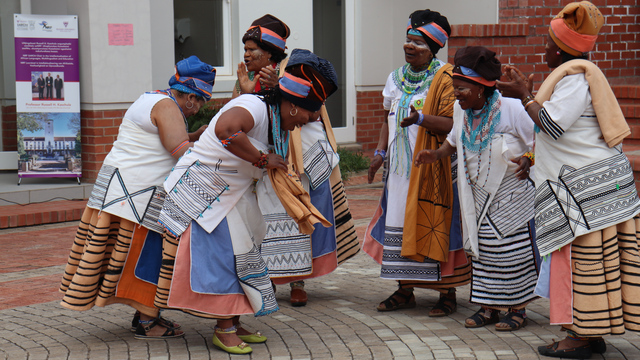
By Zindzi Nkunzi, Rhodes University contributor
Rhodes University’s African Languages and Linguistics Department concluded its series of S.E.K Mqhayi tribute events on 2 August 2019. The Department commemorated Mqhayi Day at Soll Amphitheatre.
Samuel Edward Krune Loliwe Ngxekengxeke Mqhayi was a Xhosa dramatist, essayist, critic, novelist, historian, biographer, translator and poet whose works are regarded as instrumental in standardising the grammar of isiXhosa and preserving the language in the 20th century. He was born on 1 December 1875 near Gqumahashe in Alice.
These celebrations were originally started by an isiXhosa lecturer, Dr Mhlobo Jadezweni in 2014 when he gave books to his Rhodes University first year class of isiXhosa mother-tongue, and instructed them to read and present about S.E.K Mqhayi. He educated the students about the significance of knowing and celebrating this legend and since then, it has been one of the important days in the South African calendar.
Rhodes University Vice-Chancellor, Dr Sizwe Mabizela started off by giving a warm welcome to everyone who attended the event. “Mqhayi’s work encouraged a lot of people to be proud of their languages, customs and traditions,” he said. He referred to the commended ‘father of Xhosa poetry’ as one of the individuals who contributed to the development of African languages and cultures and suggested that, it is important for today’s youth to be proud of this.
Mqhayi is remembered for his stories, the poems he recited, and showing interest in African culture, customs and tradition. Poetry, traditional songs and dance performed by various individuals, poets, primary school students and a group of women, brought smiles and laughter to the crowd. The audience included notable guests such as Mqhayi’s family, Professors from Nelson Mandela University and Fort Hare University, and representatives from the Department of Sports, Recreation, Arts and Culture and Buffalo City Municipality.
A presentation made by Dr Mfusi Hoza of Fort Hare University entitled “uMqhayi waseNtab’oZuko: Ahead of Time” covered a variety of topics such as moral degeneration, feminism, gender exclusivity and oppression. The presentation referred to various authors’ books and poems, including Ityala lamaWele (The lawsuit of twins). Referring to (Neethling & Mpolweni, 2006: 135), she said, “Mqhayi paved the way for the new multicultural democracy and he was ahead of his time in many ways. One should actually see him not only as a pioneer in a literary context, but as a forerunner to democracy, a visionary who had ideas for his country that only came to fruition 50 years after his death.”
Dr Hoza gave a vivid background on how Xhosa writings and poems were published, highlighting the significant role played by Mqhayi in the promotion and enhancement of the isiXhosa language and culture. She also shared the history of how Mqhayi and other Xhosa poets and authors were controlled and restricted from writing about certain topics. “These legends did not lose hope. They persevered and that is what has enhanced the use of isiXhosa orally and in writing,” she explained.
She said Mqhayi’s writing remains relevant to date and warned African people not to be lost in Western culture and forget who they are. “It is important for us to go back to our roots,” she said.
This day was also used to honour Rhodes University’s isiXhosa fanatic Professor Ncedile Saule. The organising committee bestowed him with a gift to show appreciation and thanked him for the crucial role he played in the promotion and enhancement of isiXhosa in writing.
